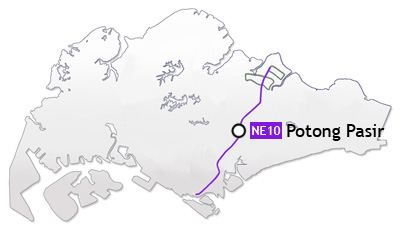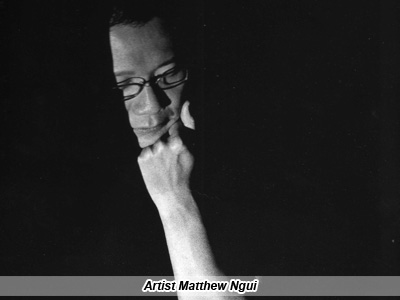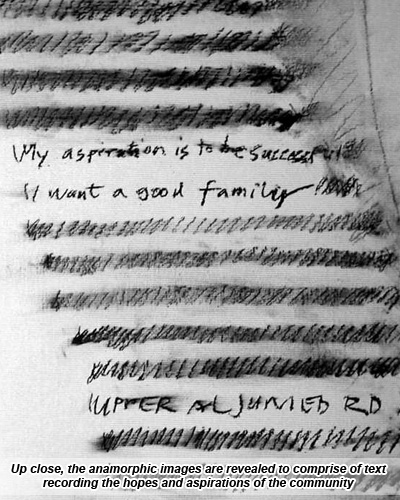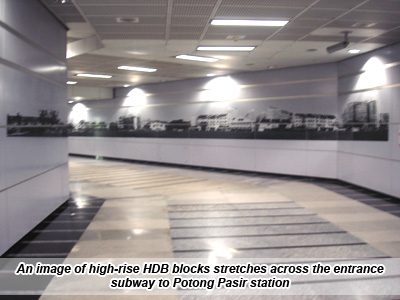|

Potong Pasir station

Located under Upper
Serangoon Road, Potong Pasir station has three entrances
serving residents of nearby Potong Pasir Estate. The
three-level station also doubles
up as a civil defence shelter, and will serve future
developments that have been planned for the area.
Like other stations of the
North East Line, Potong Pasir is designed with barrier-free
facilities to enhance accessibility to the station and
riding quality for a wide
group of commuters including the elderly, the mobility and
vision impaired, wheelchair users, families with young
children and commuters with luggage or shopping
bags. These facilities include lifts, ramps, wider fare
gates, tactile guidance system and seats with armrests.
Back To Top
Matthew Ngui's work
attempts to employ images, text, moving pictures and even
granite signposts to communicate with commuters on different
levels.<

Matthew sets out first to
present what he describes as "ordinary images" such as a man
at a bus stop or a block of flats. These images are rendered
anamorphic by
distorting and stretching them so they can be viewed as
resolved images from one perspective. Upon closer scrutiny
what appear to be textures on the images are
revealed to be handwriting, typed text or images. In their
textual statements, targeted groups within the community
share their thoughts on their daily life and
aspirations.

Back To Top
This fusion of images and
text, or what the artist calls the "macro view of the images
with the microcosmic perspective of the text", gives the
work aesthetic interest
and depth of meaning.
When you are physically
close to the work, you are confronted by the detail of the
contributed snippets of text and images which give a sense
of the thoughts of the
people behind them. And as you veer away from the wall to
the resolution point of the anamorphic image, the overall
image of the skyline, tree, bus stop or clock
becomes visible.
This aspect of connecting
with the viewer in unexpected ways embodies the essence of
Matthew's work. This concept is about rendering the opaque
transparent. The
anamorphic images reveal an element of trickery in the
processes of representation such as drawing. On the other
hand, the text reveals the "truths" behind the
images.
Matthew has proposed seven
images altogether for Potong Pasir station which are
presented from the ground level downwards. An image of HDB
blocks is placed in a
subway leading to the entrance on the junction of Serangoon
Road and Potong Pasir Avenue 1; a tree image is situated at
the north side of the concourse level and a
bus stop image is located on the southern side of the same
level.

Back To Top
The platform level
showcases four images of clocks with their times set at
morning, midday, evening and night. The accompanying text
relates to activities relevant
to those times of the day.
If the images of high-rise
flats, a tree, a bus stop and clocks seem ordinary, it is
because this is precisely what the artist intended. The
images have been selected
because of their ubiquity rather than for any special
aesthetic concern. It shows aspects of daily life. It is the
nature of their installation that becomes the point of
interest as the public will be presented with these images
quite literally from different perspectives - that is
through the unusual integration of space, image and
text.
In approaching his work
for Potong Pasir, the artist was especially mindful of the
LTA's call for "intriguing work that would engage the
community". Going one step
further, the artist wanted to engage the community in a
meaningful way by inviting the people to contribute the text
and images that would help shape the
artwork.
One subject matter the
artist addresses is the elderly, their feelings and their
memories. Text and images related to the elderly, sourced
through community centres
and homes for the elderly, are integrated onto an image of
elderly person waiting at a bus stop. The image was taken
from an actual bus stop in Potong Pasir near
the station.
In the same way, words and
images embodying the hopes and dreams of young people are
embedded in the image of a tree, chosen because it
symbolises growth.
The artist invited students from local schools to share
their thoughts on growing up and the future.
This sense of the inner
thoughts of the young and old are
complemented by accounts of daily life recorded in the words
of those who live and work in the area. These
observations are part of the images of HDB flats on the
concourse level and the clocks on the station's
platforms.
Back To Top
While the images in
vitreous enamel panelling form the backbone of the artwork
at Potong Pasir MRT station, the artist prepared three other
supporting elements to
pull the work together. These include explanation panels
situated close to the respective images, video images
integrated into the plasma screen systems of the
station and finally, granite floor pointers indicating
recommended vantage points for the work.
Explaining the thinking
behind his work at Potong Pasir, Matthew feels that it is
about creating something that does not look like what it is,
but only resolve itself when
it is seen at a certain point of view.
Artist:
Matthew Ngui Ming Fook
Born: Singapore, 1962
Education:
- LLB (Hons), 1988
National University of Singapore
- BA (Distinction), 1991
Curtin University of Technology, Western Australia
- Post Graduate Diploma (Visual Arts), 1992
Curtin University of Technology, Western Australia
next: Woodleigh station
Back To Top
|